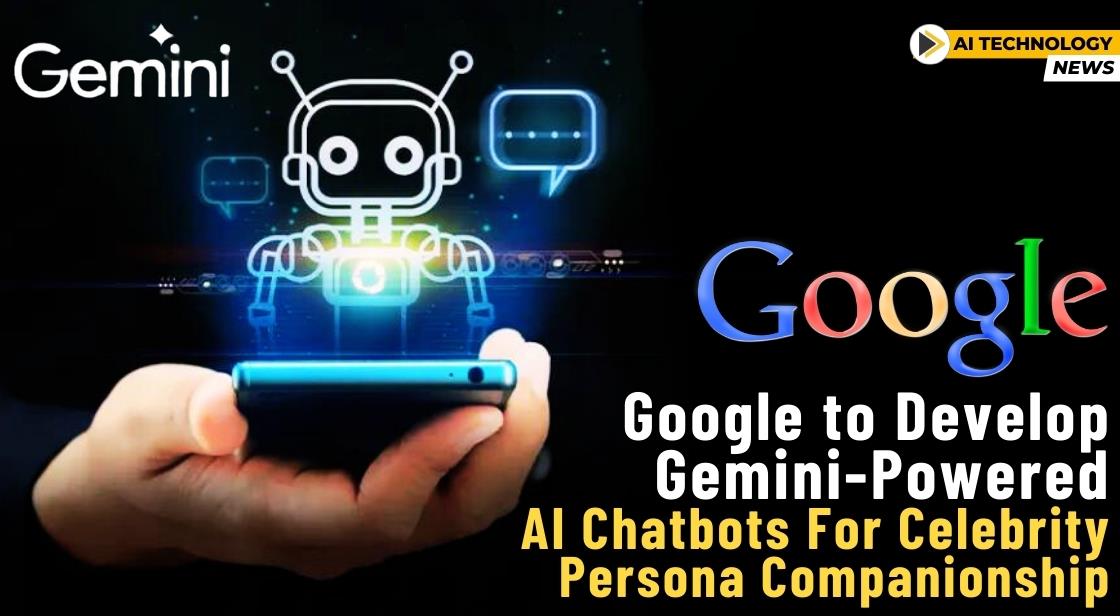Google to Develop Gemini-Powered AI Chatbots for Celebrity Persona Companionship

News Synopsis
Google is pushing the boundaries of artificial intelligence (AI) with the development of chatbots powered by its large language model, Gemini. These chatbots, unlike their information-retrieval counterparts, aim to provide companionship through engaging conversations and personalized interactions.
Beyond Information Retrieval: Chatbots as Companions
This initiative, reported by The Information and picked up by 9to5Google, marks a significant shift in chatbot technology. Google envisions these chatbots not just as information sources but as companions capable of engaging in meaningful conversations. The ability to be customized with celebrity personas or user-created characters adds a unique layer of personalization to the user experience.
Under the Hood: Powering Chatbots with Gemini
The development process for these character-driven chatbots has been ongoing for some time. Google is exploring two potential approaches:
-
Celebrity-Based Chatbots: Collaborations with social media influencers to develop chatbots that mirror their personalities offer a familiar and potentially engaging interaction for users.
-
User-Created Personalities: Empowering users to create their own unique chatbot personas based on their imagination opens doors for a more personalized and creative user experience.
The specific version of Gemini that will be used (Gemini 1.0 or the more advanced Gemini 1.5 Pro) remains unclear. However, it is important to note that this project is independent and not tied to a specific Google platform at present.
A Look at Similar Efforts: Character-Based Chatbots Gain Traction
Google's foray into character-driven chatbots isn't entirely novel. Here's a glimpse into similar projects from other companies:
-
Meta's AI Influencers: Meta has launched AI characters on its Messenger app modeled after popular social media personalities like Kendall Jenner, Charli D'Amelio, MrBeast, Snoop Dogg, and Tom Brady. These chatbots provide a familiar and potentially engaging way for fans to interact with their favorite celebrities.
-
Butterflies Social Media Platform: The new social media platform Butterflies also embraces a character-based approach.
-
Character.ai: This platform allows users to create their own AI characters by defining their traits and personalities. Users can interact with a diverse range of characters, including fictional figures like Sherlock Holmes and Tony Stark, or historical personalities like Elon Musk and Batman. Interestingly, Character.ai leverages Google's cloud services and Tensor Processing Units (TPUs) to train its AI models.
These examples highlight the growing interest in character-based chatbots and their potential to revolutionize user interaction within the digital landscape.
Conclusion
The development of these AI companions by Google signifies a potential turning point in human-computer interaction.
-
Shifting Focus: The move away from purely informational chatbots towards companions that can engage in meaningful conversations opens doors for a more emotionally-connected user experience.
-
Personalization Options: The ability to interact with chatbots modeled after celebrities or even create unique, user-defined personas offers a high degree of personalization.
-
Uncertainties and Future Integrations: While the specific application platform and the choice between Gemini 1.0 or 1.5 Pro remain unclear, the potential for integration with platforms like YouTube hints at a broader vision for these chatbots.
This Google initiative exists within a larger landscape of similar projects from companies like Meta and Character.ai. The growing popularity of character-based chatbots suggests a significant shift in how users interact with AI in the digital world.
As these technologies continue to evolve, it will be interesting to see how they shape online communication and companionship in the years to come. The success of Google's project, along with those of its competitors, will depend on their ability to create engaging and emotionally resonant experiences for users.
You May Like









